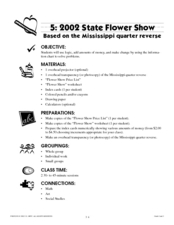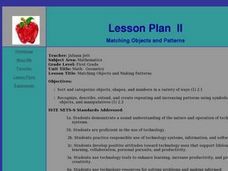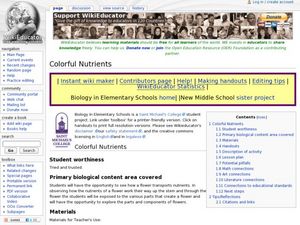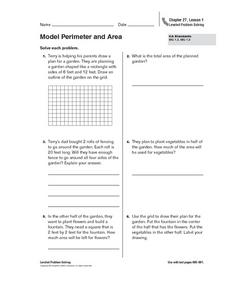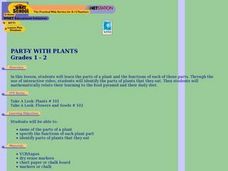Curated OER
2002 State Flower Show
Here is another State Quarter instructional activity. This one uses the Mississippi State Quarter. Pupils utilize beautifully-designed worksheets embedded in the plan, to practice calculating which combinations of flowers they can afford...
Cornell University
Garden Math
Young scientists must put their math caps on and figure out what fraction of each flower is in a raised flower bed. They must problem solve to simplify the fractions, and then graph the amount of flowers that are in different flower beds.
Curated OER
6: Parts of a Flower
Students draw and label the parts of a flower using a coin from the Northern Mariana Islands. In this flower parts lesson, students look at a transparency of the reverse side of a quarter from the Mariana lslands. They discuss the...
EngageNY
Mid-Module Assessment Task: Grade 6 Math Module 4
Halfway through the module — the perfect time for an assessment. The 18th installment of a 36-part series is a mid-module assessment. Scholars provide evidence of understanding through various mathematical and contextual problems.
Curated OER
Growing Lemons & Counting Numbers
Have your young gardeners practice their counting with a lemon tree that's missing its lemons and a flower that's missing its leaves. Included are the two plants and a set of 10 lemons, 10 leaves, and 10 numbers. See the materials tab...
Curated OER
Does The Type of Mulch Used Affect Plant Growth?
Students measure, record and graph the plants they grow in a controlled setting. They feed and water the plants as needed and use the scientific method to evaluate the growth.
Curated OER
Flower Comparison Activity
Elementary schoolers write equations for comparisons and make a pictograph based on their comparison. Answers included on page 2.
Curated OER
Prairie In A Bottle
Second graders observe images of prairie ecosystems and discuss the needs of living things. They create a prairie habitat in a closed jar to observe the water cycle and plant growth.
Curated OER
Tiptoe Through the Tulips
In this estimation instructional activity, 3rd graders look over 4 pictures and choose by multiple choice what part of each garden is planted with tulips. Students draw two original maps as requested at the bottom of the instructional...
Curated OER
Matching Objects and Patterns
First graders participate in hands-on activities and use objects to create patterns. They observe a PowerPoint lesson describing matching objects and patterns. In groups, 1st graders complete geometry computer activities such as planting...
Agriculture in the Classroom
Pumpkins... Not Just For Halloween
Celebrate fall with four pumpkin themed hands-on activities! After learning about pumpkins, scholars complete two activity sheets that reinforce estimation and word problems. They then plant pumpkin seeds and bake a pie in...
Curated OER
Planting Phil's Garden
Students explore gardening. For this agriculture lesson, students plan and plant seeds according to the procedure modeled by a "master gardener." Flowers are distributed at a local retirement home.
Curated OER
How Does Your Plant Grow?
Students measure and record their height in centimeters on a graph. By integrating math and science, students collect data and apply graphing skills to the experiences they are having growing plants. Finally, students identify how to...
Curated OER
Baobab Tree Math
In this tree math learning exercise, students read about baobab trees and answer math word problems about them. Students complete 3 problems including distance problems, making a chart, and calculating measurements.
Curated OER
Colorful Nutrients
Students participate in an experiment to understand how plants get nutrients. For this plant nutrition, lesson students examine how colored water goes through the stem of a plant to the flower. Students discuss the parts of the flower...
Curated OER
The Great Pollinators
Students discover the reproductive parts of a plant. In this biology lesson, students identify and categorize several different plants they dissect in class. Students record their information using a data chart.
Curated OER
Locus at a Fixed Distance
In this locus at fixed distance worksheet, 10th graders solve 10 different problems related to determining a fixed distance. First, they write the equation of the locus of points a certain number of units from the x-axis. Then, students...
Houghton Mifflin Harcourt
Model Perimeter and Area
Gardens seem to be the go-to for area and perimeter word problems. In this assignment, gardening consultants advise Terry, who is helping his parents plan for planting. They draw the outline of a garden on a grid and then perform...
Curated OER
Spring Potted Plants
Students identify and interpret plant growth as well as gain graphing skills and other important knowledge related to potting plants. They take a regular milk jug and cut off the top, leaving the handle and the rest intact. Then,...
Curated OER
The Plant Bartering System
Fifth graders explore plant characteristics by viewing a flower and seed presentation. In this environmental adaptation activity, 5th graders identify specific traits plants have in order to allow them to grow in different climates...
Curated OER
Nine Cherry Trees
In this secondary mathematics learning exercise, high schoolers solve a problem in which they determine the planting arrangement of nine trees so that they form ten straight rows with three trees per row. The one page learning...
Curated OER
Body Language
First graders investigate the three main parts of a plant. In this plant parts lesson, 1st graders explore vocabulary for the topic and read a story about plant parts. Students view a PowerPoint and take a quiz for the topic....
Curated OER
Party with Plants
Students watch a video on plant parts and identify the function of plant parts. In this plants lesson plan, students identify the parts of plants they eat and relate it back to the food pyramid and perform math problems as they do this.
Curated OER
Hollie's Gigantic Garden
In this math puzzle learning exercise, students put their problem solving skills to use as they fill in the plant growth charts that require them to write and solve equations.
